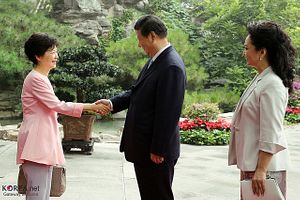Not for the first time, South Korea is struggling to balance its competing relationships with the United States and China. The latest sources of discord: a U.S. missile defense system and a China-led regional investment bank.
China has strongly opposed U.S. proposals to deploy the Terminal High-Altitude Area Defense (THAAD) in South Korea as an ostensible counter to North Korean missile threats. The missile defense system would bring within range a significant portion of China’s stockpile of ballistic missiles.
The U.S., meanwhile, has reportedly urged allies including South Korea to refrain from joining the burgeoning Asia Infrastructure Investment Bank, expressing concerns about its governance and transparency.
Seoul’s dilemma is that it considers both countries vital to its interests. The U.S. remains South Korea’s security patron, stationing some 28,500 troops in the country as an ostensible deterrent to North Korea; China is its largest trade partner.
“It couldn’t dramatize the Korean predicament better, where economically, sort of everything is toward China, in terms of growth, but then in terms of security, everything still points back to the United States,” John Delury, an associate professor of Chinese studies at Seoul’s Yonsei University, told The Diplomat. “And so, you can see Seoul kind of being pulled between the two.”
The Seoul government has been slow to outline a clear stance on either issue, at times sending mixed signals about its intentions. In late 2013, then Minister of Defense Kim Kwan-jin said South Korea would not be joining THAAD, electing instead to develop its own missile defense system. Yet this week, Yonhap News Agency reported that the U.S. military has plans to deploy THAAD on the peninsula in the event of an emergency, prompting U.S. denials in a subsequent article in Stars and Stripes.
Similarly, South Korea declined to join China’s answer to the World Bank at its inception last October, seemingly bowing to U.S. pressure, as reported by The New York Times. But just this week, The Korea Herald, citing anonymous government officials, reported that Seoul was poised to join the bank after all, despite U.S. concerns. A final announcement is expected at the end of this month.
Delury said it was natural for Seoul to try to derive maximum benefit from relations with both countries, but that indecisiveness could ultimately add unnecessary strain to each relationship.
“I think the lesson, maybe, that the South Korean government could learn from this latest round is that what they call ‘strategic ambiguity’ doesn’t always work, and just putting off the decision can actually make the decision worse,” he said.

































